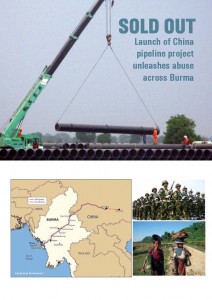SOLD OUT: Launch of China Pipeline Project Unleashes Abuse Across Burma
By Shwe Gas Movement • September 6, 2011 Construction of various project components to extract, process, and export the Shwe gas – as well as oil trans shipments from Africa and the Middle East – is now well underway. Local peoples are losing their land and fishing grounds without finding new job opportunities. Workers that have found lowpaying temporary jobs are exploited and fired for demanding basic rights. Women face unequal wages, discrimination in the compensation process, and vulnerabilities in the growing sex industry around the project.
Construction of various project components to extract, process, and export the Shwe gas – as well as oil trans shipments from Africa and the Middle East – is now well underway. Local peoples are losing their land and fishing grounds without finding new job opportunities. Workers that have found lowpaying temporary jobs are exploited and fired for demanding basic rights. Women face unequal wages, discrimination in the compensation process, and vulnerabilities in the growing sex industry around the project.
Resentment against the so-called Shwe Gas Project is growing and communities are beginning to stand up against abuses and exploitation. Despite threats and risk of arrest, farmers and local residents are sending complaints to local authorities. Laborers are striking for better pay and working conditions and women running households are demanding electricity.
Meanwhile active fighting has broken out between armed resistance groups and government troops in the area of the pipeline corridor in northern Burma. The Korean, Chinese and Indian companies involved in this project are taking tremendous risks with their reputations and investments. Social tensions, armed confl ict, human rights abuses, and lack of project standards have raised concerns in investor circles and caused at least one pension fund to divest from the Korean firm Daewoo International, the main developer of the gas fields.
Download the report in English and Burmese here.
Tags: Arakan State, Oil and Gas Pipeline, Shwe Gas Movement, Shwe Gas ProjectThis post is in: Business and Human Rights, Environmental and Economic Justice, Spotlight
Related PostsU.S.: Lifting Sanctions on Myanmar Puts Human Rights Progress At Risk
Advisory Commission on Rakhine State – A Welcome Investigation into Arakan State’s Human Rights and Humanitarian Crisis
NLD Government Must Lift All Aid Restrictions in Arakan State
United States Commission on International Religious Freedom – Burma: 2016 Annual Report
(၂၉) ႏွစ္ေျမာက္ စစ္ေတြဆန္ျပႆနာေန႔ ဝမ္းနည္းေအာက္ေမ့ဖြယ္ အထိမ္းအမွတ္ သေဘာထားထုတ္ျပန္ခ်က္









 All posts
All posts